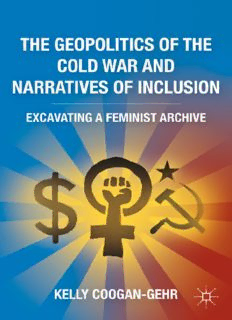
The Geopolitics of the Cold War and Narratives of Inclusion: Excavating a Feminist Archive PDF
Preview The Geopolitics of the Cold War and Narratives of Inclusion: Excavating a Feminist Archive
The Geopolitics of the Cold War and Narratives of Inclusion The Geopolitics of the Cold War and Narratives of Inclusion Excavating a Feminist Archive Kelly Coogan-Gehr THE GEOPOLITICS OF THE COLD WAR AND NARRATIVES OF INCLUSION Copyright © Kelly Coogan-Gehr, 2011. Softcover reprint of the hardcover 1st edition 2011 978-0-230-12045-7 All rights reserved. A significant portion of Chapter Four, “The Politics of Race in US Feminist Scholarship: An Archaeological Approach” first appeared in “The Politics of Race in U.S. Feminist Scholarship: An Archaeology” (2011) Signs 37(1): 83–107, which is published by the University of Chicago Press. Revision of "Feminist Scholarship: Excavating the Archive," PhD diss., Rutgers University, New Brunswick, NJ, 2009. Quotes from author’s October 23, 2007, interview in New York, New York, with Catharine Stimpson are printed by Catharine’s permission. Quotes from author’s November 9, 2007, interview in Palo Alto, California, with Barbara Gelpi to are printed by Barbara’s permission. Excerpts of Bonnie Thornton Dill’s letter to Catharine Stimpson, dated November 19, 1979, (located in Signs archives, Special Collections and University Archives, Rutgers University, Alexander Library. Box 26, Folder: Minority Women) are reprinted by permission of Bonnie Thornton Dill. Portions of Elizabeth Higginbotham’s letter to Barbara Gelpi, dated March 2, 1982 (located in Signs archives, Special Collections and University Archives, Rutgers University, Alexander Library. Box 26, Folder: Communities of Women) are reprinted by permission of Elizabeth Higginbotham. First published in 2011 by PALGRAVE MACMILLAN® in the United States—a division of St. Martin’s Press LLC, 175 Fifth Avenue, New York, NY 10010. Where this book is distributed in the UK, Europe and the rest of the world, this is by Palgrave Macmillan, a division of Macmillan Publishers Limited, registered in England, company number 785998, of Houndmills, Basingstoke, Hampshire RG21 6XS. Palgrave Macmillan is the global academic imprint of the above companies and has companies and representatives throughout the world. Palgrave® and Macmillan® are registered trademarks in the United States, the United Kingdom, Europe and other countries. ISBN 978-1-349-29868-6 ISBN 978-0-230-37055-5 (eBook) DOI 10.1057/9780230370555 Library of Congress Cataloging-in-Publication Data Coogan-Gehr, Kelly. The geopolitics of the cold war and narratives of inclusion : excavating a feminist archive / Kelly Coogan-Gehr. p. cm. 1. Feminism—Political aspects. 2. Women in development. I. Title. HQ1236.C635 2011 305.4209(cid:2)045—dc23 2011016919 A catalogue record of the book is available from the British Library. Design by Newgen Imaging Systems (P) Ltd., Chennai, India. First edition: November 2011 10 9 8 7 6 5 4 3 2 1 For the women who dreamed, conceptualized, and had the guts, fortitude, and the incisiveness to make Signs C O N T E N T S Acknowledgments ix One Origin Stories: A Critique of the Stock Narrative of Feminist Field Formation 1 Two Signs and the Geopolitics of Education in the United States 35 Three Signs Encounters the Global South 53 Four The Politics of Race in US Feminist Scholarship: An Archaeological Approach 87 Five Conclusion: Lessons from Signs: Revisiting Feminist Field Formation 113 Notes 125 Bibliography 163 Index 179 A C K N O W L E D G M E N T S A central argument in this book is that all scholarship is collective in scope, and this effort is no exception. Many individuals were involved in its taking shape. First and foremost, this book would not have been pos- sible without the extreme generosity of Signs: Journal of Women in Culture and Society and the insights of the journal’s first editor-in-chief, Catharine Stimpson, and second editor-in-chief, Barbara Gelpi. Throughout the book I am critical of certain editorial decisions made during their ten- ures, but I firmly believe that Signs would not be the premier academic feminist journal it is today had it not been for their superb and visionary leadership and guidance, their immense generosity as scholars and human beings, and their resolve in the success of women’s studies and feminist scholarship at a time when such resolve was unpopular. The critique herein comes from a place of deep admiration, respect, and gratitude for the editorial work of Catharine Stimpson and Barbara Gelpi. I owe an enormous debt to several persons for their engaged, honest, and astute criticisms and suggestions for revisions on earlier versions of this manuscript. The individual most deserving of my gratitude is Mary Hawkesworth, who read through and advised edits on several drafts, brainstormed with me numerous times in an effort to help clar- ify the structure of my arguments, and guided me in a way that enabled me to freely develop an intellectual identity distinct from my mentors and professors. The revaluing of generosity—which I argue is at the core of labors responsible for building and maintaining feminist field formation and for which this book calls—is in no small part inspired by Mary’s generous mentorship. It is also inspired by Judy Gerson, who has provided invaluable intellectual feedback at every stage of this manuscript’s development and moral and emotional support in match- ing amounts, a rarity in academe—thank you, Judy, for having the courage to break the mold. Also deserving of special thanks are Liz Grosz, Fran Bartkowski, and Louisa Schein for their comments on this
